Home » Jazz Articles » Interview » Paul Augustin: Putting Penang On The Jazz Map
Paul Augustin: Putting Penang On The Jazz Map
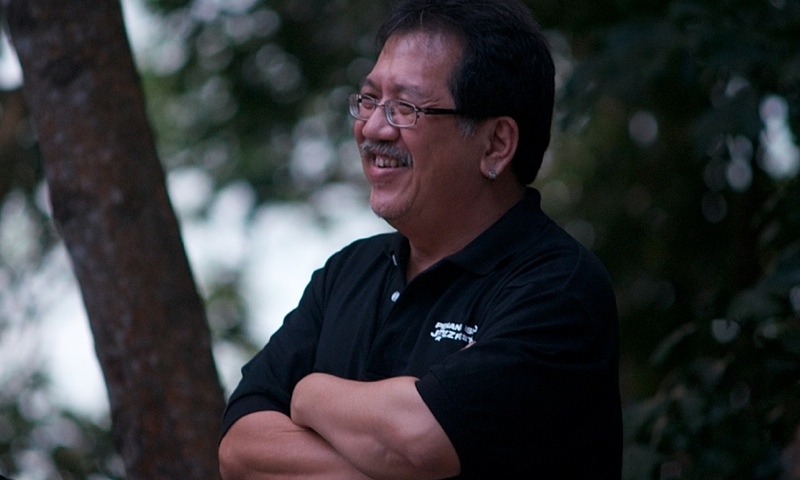
We hope our audience will grow to learn that the term jazz is actually bigger than just swing music, fusion or funk. The music has evolved so much
—Paul Augustin
The PIJF may not be the first jazz festival in Malaysia but it holds the distinction of being the longest-running one. Where others have fallen by the wayside the PIJF has dug deep roots and flourished. This year PIJF celebrates its 10th anniversary and festival Director Paul Augustin is in expansive mood as he takes stock of the challenges and achievements of the past decade. It certainly hasn't all been plain sailing and the number 10 has something of a magic ring to Augustin: "Am I surprised? Yeah, of course. I'm surprised we even got to number five," he says laughing. "We lost nearly everything with the first one."
The idea for a jazz festival in Penang dates back to the mid-1990s, when Augustin and his long-standing business partner, Chin Choo Yeun were working in Kula Lumpur running a stadium: "It was a privatized stadium; Chin was the Executive Director and I started off as the Events Manager and eventually became the Group Events Manager," says Augustin. "We were often asked to look at bands for the stadium. That was when we started researching the jazz festival. "
In 1996 Agustin and Choo Yeun left the stadium and set up their own events management and consultancy company, Capricorn Connection. "We went to a lot of people and told them we wanted to do a jazz festival but nobody thought it was going to work," Augustin recalls of their initial attempts to get the ball rolling. They did, however, gain valuable hands-on experience when in 2003 the Kuching Jazz Festival—which had experienced a difficult first two years—asked Capricorn Connection to help turn the festival's fortunes around.
"We did that," says Augustin, "and then in 2003 we were asked to look at and manage two other festivals and we did that too. But when you manage festivals on behalf of people they then decide that they can then do it themselves or else ask somebody else to do it and that's what happened. We were replaced."
The festival managing had provided what Augustin describes as "a bit of know-how" and plenty of useful contacts in the industry. The stage was set in 2004 for the very first PIJF.
The first edition of the PIJF was a humble 2-day, 1 stage affair with a few workshops and a small jazz gallery exhibition. The bands were mostly local/Malaysian, like the Aseana Percussion Unit or ex-pat bands such as drummer/percussionist Steve Thornton, who had played with trumpeter Miles Davis, pianists Herbie Hancock and McCoy Tyner. There were a couple of regional bands from South Korea and award-winning Australian a cappella group The Idea of North. "The festival was a calculated risk" Augustin admits, "and after the first edition we lost so much money we nearly closed the company down."
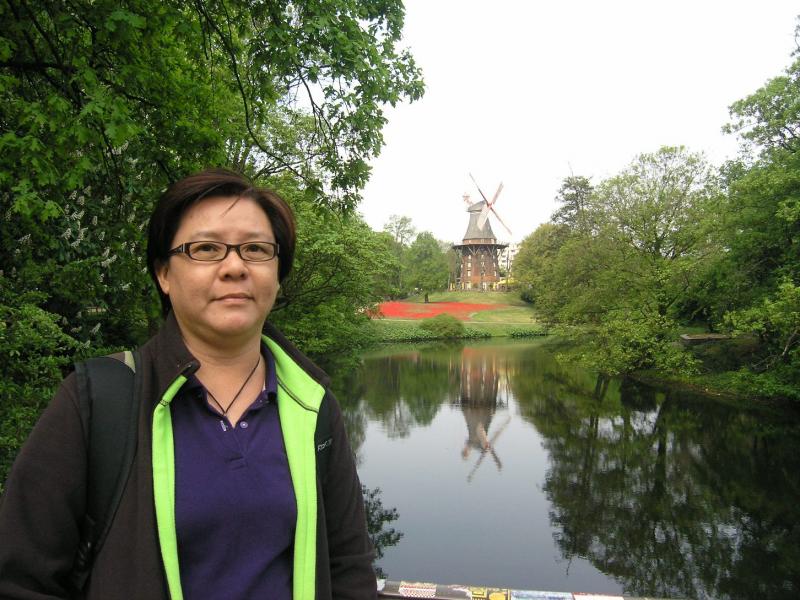
Many might have cut their losses and run but Augustin's business partner Choo Yeun wasn't ready to throw in the towel after the financially calamitous first edition of 2004: "Chin said "We're going to do this next year," recalls Augustin. "I looked at her and said "Are you sure you want to do it?" We did it with a little bit of support and for maybe half the cost of the first edition. The second year was the key year."
The diversity of jazz-related genres (and beyond) in the 2004 edition set a blueprint which the PIJF has made its trademark, though with greater risk-taking in the programming over the years. The second edition pretty much followed the pattern of the first, musically speaking, though saxophonist Greg Lyons Nonet and pianist David Gomes' Trio featuring singer Junji Delfino raised the bar a tad. Significantly, the 2005 edition expanded to three days and featured discussion forums for the first time.
The financial difficulties of the first year certainly hadn't dampened Augustin and Choo Yeun's enthusiasm nor altered their shared vision to make the PIJF a success. Augustin cannot praise Choo Yeun's role highly enough: "Chin has put up with many of my ideas, ramblings, grumblings and a whole lot of nonsense," he admits. "Very, very often she's kept the ship on the right course, steering me and the team when we have tended to go off-course. She is very much the cornerstone of the festival foundation."
Thanks to Choo Yeun's insistence PIJF made it to the second year. Augustin remembers clearly at the end of the second edition of PIJF sitting in the lobby chatting with fellow jazz festival director JJ Inn, of South Korea's now world-renowned Jarasum International Jazz Festival: "JJ looked at me and said, "Now you've done the second one you know what's going to happen now, don't you?" I said "Yeah, I've got two feet in the water now and I can't stop." We had to do the third one," he relates.
For the third PIJF the cavalry arrived in the form of a major sponsor, Mercedes: "The third year was much easier," acknowledges Augustin. "Our main objective of the festival that year was to make them [Mercedes] happy, which they were. With everybody all-smiles, Augustin proposed that Mercedes commit to the PIJF for three years, which the auto giant was pleased to do: "So, we had no choice but to go on to number six," says Augustin laughing.
Solid sponsorship meant that the PIJF could stretch its programming ambition and the middle years of PIJF attracted groups from Vietnam, Thailand, and Singapore and increasingly from Europe and North America. Artists featured included South Korean singer Youn Sun Nah, former Genesis guitarist Steve Hackett, bassist Janek Gwizdala and drummer Jojo Mayer, Norwegian trio In The Countryand pianist/organist Jeremy Monteiro's Organamix.
Importantly too, in terms of raising its profile, the PIJF was also able to invite international media and 2011 saw a Malaysian government-sponsored media pack hailing from New Zealand, Italy, Indonesia, Norway, Canada, Japan, Slovenia, Singapore and Laos. Music magazines, travel and lifestyle magazines all gave important exposure to the PIJF and to Penang itself as a world class holiday destination; even Reader's Digest got in on the act.
Mercedes also sponsored the PIJF for its seventh edition but a worldwide policy restricting event sponsorship to a maximum of five years meant that Augustin and Choo Yeun were scrambling around once again to secure sponsorship for the following year.
By this time the PIJF's name had grown internationally and increasing numbers of bands from all over the world wanted to play the main stage. Without a major sponsor, however, there wasn't the money to attract big names to the PIJF.
Penang, though can offer something else, and that is a potential gateway to other festivals in the region and beyond: "We worked on getting people of good standing in the industry, festival directors, promoters and agents to come here," Augustin points out. "Once bands play here they get recognized by other festivals. They might go on to play Jarasum, Hong Kong, and Singapore; they make the contacts here."

Over the past decade Agustin and PIJF have striven to foster relationships with other jazz festivals throughout Asia and Europe: "Relationships are very important," Augustin emphasizes. "They are the most important thing. When I travel to other festivals or conferences I'm not thinking about bringing bands here or selling bands. I'm trying to build relationships with people. If you can build a good relationship with someone then, with patience, everything else will come."
To this end, the PIJF has developed a close working relationship with JJ In, Director of the Jarasum International Jazz Festival in South Korea: "We have a kind of Memorandum of Understanding with Jarasum to help promote each other's festivals and to exchange bands between the two countries," explains Augustin. "It has helped both of us, but especially Penang because a lot of people want to play Jarasum and one of the ways for them to do it is through Penang. Almost every year, exciting South Korean jazz bands have played PIJF, with the outstanding pianist Francesca Han giving a most memorable performance at PIJF 2012.
Malaysian bands too have played Jarasum; the Aseana Percussion Unit, Andy Peterson Inc, Paul Ponnudarai, James Boyle & Ragged Tigers, Ocean of Fire & Dasha and The Roger Wang Trio have all gained important international exposure and large festival experience at Jarasum. The JIJF, like PIJF celebrated its 10th anniversary in 2013 and it may give small jazz festivals everywhere hope to learn that Jarasum, which almost went bankrupt after three editions, attracted over 230,000 people at its 10th anniversary bash. The PIJF also looks to the Hong Kong International Jazz Festival for similar mutually beneficial exchanges: "We have a good relationship with [HKIJF Director] Peter Lee," says Augustin, "who's also involved with a couple of jazz festivals in China."
Lee brought one of the most original bands to play the PIJF, Taiwan's Sizhukong, whose blend of traditional Chinese and Western instrumentation on original material drawing from Chinese/Taiwanese folkloric tradition and jazz lit up the main stage of the PIJF in 2009. Collaborations with other countries in the region have been less productive: "We've tried to do the same with Singapore and Indonesia," says Augustin, "but it's a little more difficult because they look upon Penang as the little brother."
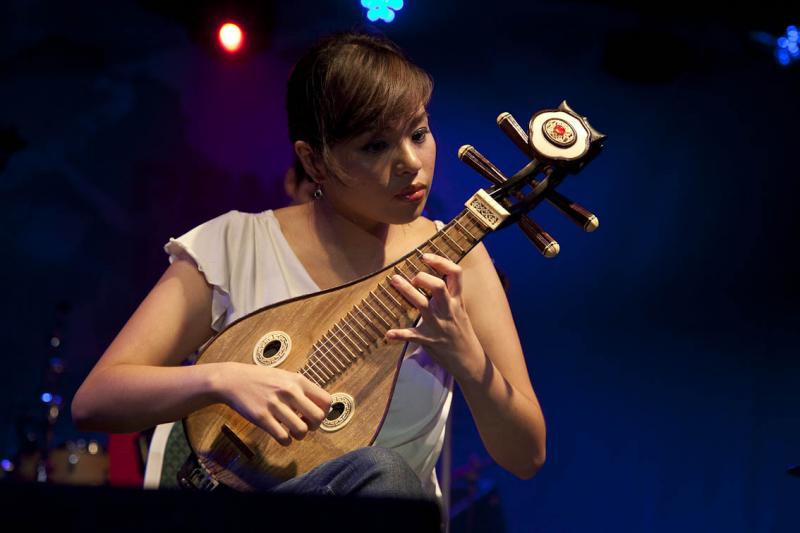
The exception has been Indonesia's premiere jazz advocacy organization Wartajazz, which has brought the best of Indonesian jazz to Penang on a number of occasions. The trio BOI AKIH—a sort of little Shakti—gave a thrilling performance at PIJF 2010, while trumpeter Rio Sidik did likewise in 2011. Augustin is always looking to forge new relationships with festivals and promoters with the joint aims of bringing new sounds to PIJF and potentially opening doors to Malaysian bands to play abroad. Augustin's growing links to Thailand has seen Thai saxophone legend Koh Mr. Saxman headline the Saturday night of PIJF 2009. For the 10th edition of PIJF Jazz Kamikaze will grace the main stage thanks to Vichart Jirathiyut, who represents Jazz Kamikaze in Thailand.
As the years have passed and the PIJF has firmly established itself in the national and international music calendar, Augustin's programming has been astute and increasingly adventurous: "I've said this before but in the first couple of years people always asked us who was playing the festival," says Augustin, "but after the first few editions people knew that no matter who we put on in the festival it would be good music, even if they'd never heard of the groups."
Increasingly, Augustin fields people's requests and an ever growing number of formal applications from bands: "This year we got over 300 applications and inquiries from groups who wanted to play the festival and there were some really big names. The big names we immediately tell them, look, don't even bother to name a price because there's no way we'll be able to afford it. They might get really irritated with us," laughs Augustin, "but it simply comes down to what we can afford.
"Every artist that gets put into the festival is there for a reason, be it for the audience or because we want to build a relationship with somebody or because we want to create an image of the festival, or because we want to introduce people to new things—an element of discovery." Bands like the avant-rock band Electric Barbarian, the pulsating tuba-led trio PELbO and the heavy jazz fusion of Lithuanian band Dainius Pulauskas Group have certainly asked an open mind of the Penang crowd, which has responded every time.
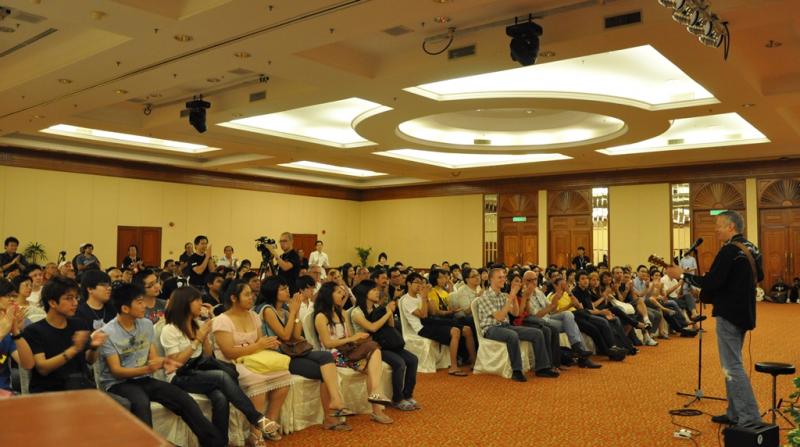
Augustin clearly loves to see how the festival audience reacts to the innovative and the unknown: "This year it's going to be really interesting to see how people respond to Yoon-Jeong Heo Black String," he enthuses. Geomungo player Heo, guitarist Jean Oh, daegum player Aram Lee and percussionist/vocalist Min-su Kang blend Korean traditional music with a jazz/improvised aesthetic in what promises to be one of the most fascinating concerts of PIJF 2013: "I think they're going to blow people away," grins Augustin.
"We're willing to take risks," he adds. "We like to push people's buttons and see what happens. It's getting easier to program the festival in the sense that we've got a lot more choices, and more challenging in the sense that everybody wants to play."
Augustin is careful not to program two bands of the same genre on the same day, and whilst the budget dictates who PIJF can and cannot afford, there is another all-important criteria: "It also boils down to the attitude of the band," admits Augustin. "We don't want bands that make us bend over backwards to satisfy their strange requests—a bottle of this white wine form that place, a bowl of this type of fruit or that type of fruit," he laughs. "A festival is about having fun and we don't want all those sorts of problems. We work really hard to accommodate everybody but sometimes you can't."
Perhaps for one or more of the above reasons the PIJF hasn't yet secured the services of pianist Keith Jarrett, but Augustin remains optimistic: "You never know, man. You never know."
Kuala Lumpur, on the face of it, may have seemed like the most obvious location for Malaysia's flagship jazz festival, but both the location of Penang and the festival's name made good sense to Augustin and Choo Yeun: "When doing our initial research we realized that a lot of festivals that grew to be big are not held in the main cities; Pori Jazz, North Sea Jazz Festival, even Jarasum is not in Seoul," Augustin notes. "Penang had the infrastructure and all the hotels. It's a tourism island and it's by the beach. You can't find a beach in Kuala Lumpur, man" he laughs. "Also in the main city you have a lot more competition—a lot more people want to do the same thing. Penang made more sense at that time and it gave me the opportunity to go back home every once in a while. I was born in Penang. I grew up in Penang."
The trend among many jazz festivals the world over is to use "international" in the festival name, as though it automatically and magically confers prestige but that was never on the cards for Augustin: "Some people asked us why we didn't we call it a Music Festival or use the name International Jazz Festival but there were three key reasons; one, jazz is relatively safe in terms of getting permits from the government because it's old people's music," he laughs. "Secondly, the Island was a promotional tool and we didn't want to call it International because of the Bird Flu epidemic at a time when people were scared to come to this part of the world. Thirdly, in the early days we thought that if we couldn't get international artists we'd look silly with the name International Jazz Festival."
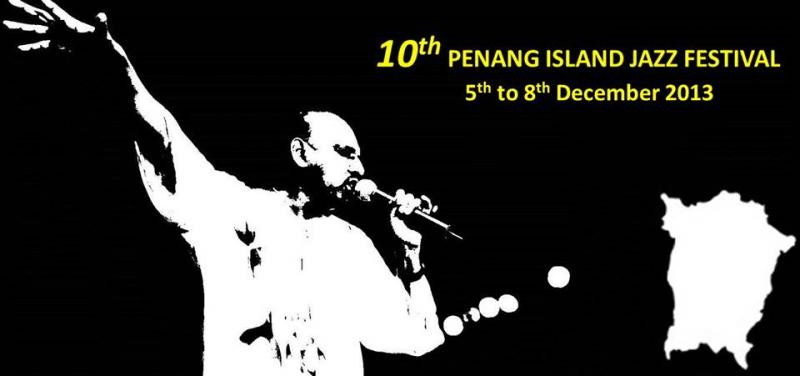
In the ten years since the PIJF began, numerous other jazz festivals have sprung up in the region in Borneo, Thailand, China, Indonesia, the Philippines and India. Augustin, however, is not entirely sure if this trend signifies a growth in interest in jazz: "Generally, everybody wants to do a festival but different people have different ideas what a festival should be. I think people thought after we started, hey, if they can do it we can too.
"I think the perception many people have of the PIJF is that we must be making a lot of money and they want the same. But making money is the least of our worries at this point in time. It was basically to push the music industry and establish a foundation that we could carry on and develop in many ways," Augustin says. "If we just worried about making money we wouldn't be doing this. We'd be doing something else, because there's no money in this; in the long run maybe."
With each edition of PIJF Augustin has attempted to promote young Malaysian musicians and through talks and workshops to hopefully inspire wannabe musicians and teachers alike: ""It's an educational thing," says Augustin. "You have to get the musicians close to the young people so that's why we have workshops. We give the opportunity to young people to play and get them involved. " The first PIJF in 2004 featured a Young Jazz Talent competition but it soon changed its character after a couple of editions: "I think a lot of young Malaysian musicians were scared of the word jazz and we started losing participants," says Augustin. "They thought they weren't good enough or weren't jazz enough. Once we realized that we decided to do something else."
That something else was Creative Malaysia, which invites and encourages young musicians/groups based not on their jazz credentials but on their creativity. The change from the Young Jazz Talent competition to the Creative Malaysia format was largely inspired by Augustin's frequent visits to jazz festivals in Europe: "When I went to Europe with Choo Yeun, to Norway, Germany, Finland, even Korea, we started to realize that jazz in Europe is not the way that we think jazz is. It's more open. It opened a really big door for us because a lot of people here were very creative but they had no platform. So, we shifted our mode of thinking.
"We decided that our festival would be more creativity-driven so we had to get the creative input of the local musicians." In Malaysia, by and large, that meant Indie musicians because as Augustin points out, "jazz musicians here generally play the same stuff that other jazz musicians are playing—the same standards. They're doing stuff I've heard a hundred times before from different people. The only way they can catch my attention is if it's different" Rather than program staid music, simply because it was jazz, Augustin threw his weight behind Malaysia's young Indie musicians.
In the past 2 editions since Creative Malaysia got up and running dozens of young Malaysian bands have been given a platform by the PIJF, playing on the fringe stages. The initiative has thrown a little spotlight on some very promising musicians/groups. Augustin offers food for thought for aspiring groups: "A lot of bands are into making the audience happy and giving them what they want. When you do that you compromise your creativity. I keep telling them, Malaysia has got something that nobody else has; we have different rhythms like joget, ronggeng, asli, or krongjong so why don't you use them? Put them in jazz; that will immediately make you stand out from the rest of the world."
Another side of the PIJF that has grown over the years has been the Island Jazz Forum, which brings together important players from the international jazz world to share their knowledge and opinions on contemporary jazz-related issues: "The first forum we had was basically a local forum," says Augustin. "We got somebody from the television station, somebody from the newspaper and somebody from radio and it was jazz from the perspective of the media. We realized that we had people like Peter Lee and JJ Inn coming here so we decided to do something on a regional level. We had jazz in the education system, and then we had the creative economy of jazz. It's about an exchange of ideas and the people who come learn something. This year it has escalated to four topics. I don't know if anybody will come," jokes Augustin "so I told Ben Mandolsen to bring his ukulele just in case."
Mandolsen, a fine musician in his own right is founding Director of WOMEX (World Music Expo), the world's largest and most important networking conference and showcase for World Music. Augustin was invited to WOMEX in October 2013 where he gave a paper entitled "Crossing Borders: Programming World Music Artists in Asian Jazz Festivals." Naturally, it raises the questions as to the status of the relationship between jazz and World Music and the programming considerations of the PIJF.
"I think the boundaries are slowly being erased," Augustin says. "I submitted the paper because I could see that WOMEX was getting more into jazz. They have a small jazz program now in WOMEX. Mandolsen has also been invited to give a talk at EJN [European Jazz network]," adds Augustin. "WOMEX is accepting jazz as part of its program and jazz is also looking at World Music, though I think it's easier for a World Music musician to be programmed in a jazz festival than it is for a jazz musician to play a World Music festival."

The PIJF has staged a number of bands that are much more World Music than jazz but there have been very few complaints from anybody: "In the past nine years we've just had one guy who walked in and said "you call this a jazz festival?" and then walked out," says Augustin. "If we program just straight ahead jazz like [trumpeter] Wynton Marsalis, with all the bands playing the same stuff then after two bands the crowd are just listening to one long song. We try to strike a balance and offer discovery. We hope our audience will grow to learn that the term jazz is actually bigger than just swing music, fusion or funk. The music has evolved so much."
One constant in an ever-evolving festival has been the location of the PIJF. Situated right by the beach, the Bayview Beach Resort is a delightful environment to stage a jazz festival and the continuity has been an important factor in the smooth running of the festival: "In terms of logistics it's very, very important," emphasizes Augustin. "Even before we go in we already know what we want and what we need.
"Some hotels might change the manager every few years but the policy of the Bayview Beach Resort is to keep the same manager and the same staff as long as possible. That stability is very important," acknowledges Augustin. "The GM of the Bayview Beach Resort, Edwin Young liked the idea of a jazz festival and supported us. He felt that the PIJF could grow to be big. So every year we go there it's the same people and the system is well set. The hotel loves us because when we go in we basically know what we're doing. Let's not fix what's not broken."
The tendrils of the PIJF have extended to include other venues in the festival, including the Hard Rock Café Penang, The Parkroyal Resort and the award-winning botanical garden the Tropical Spice Garden, which this year will feature a sunrise concert. It's perhaps something of a surprise that the PIJF has not established a presence in Penang's World Heritage Georgetown—one of the finest preserved areas of the old Far East anywhere in Asia: "Of course we would love to," admits Augustin. "Our initial idea was to have bands playing on the ferries as they cross from Butterworth to the mainland of Penang, bands at the airport and other locations but we just don't have the money so we can't do it. A lot of places are happy for you to use their space but you have to factor in equipment, transportation, payment for the artists, food and drink. Location alone is not support enough. We need greater support."
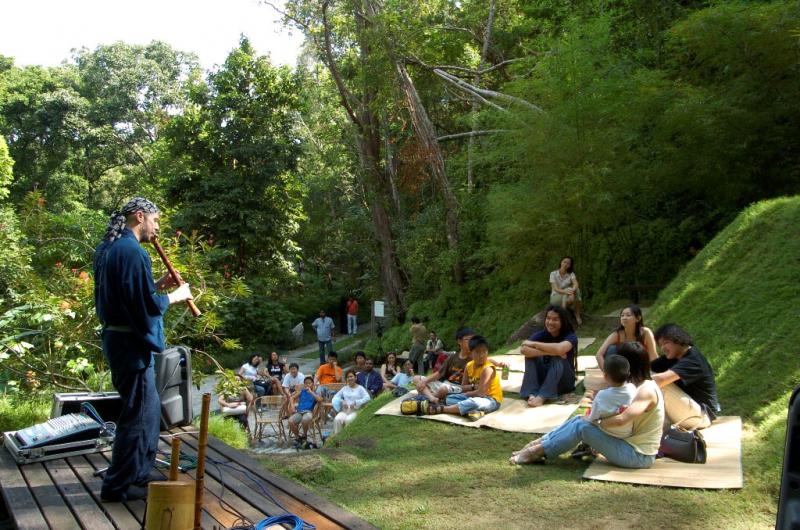
Loyal support has certainly come from the PIJF crowd, who turn out year after year come rain or shine to enjoy the music. "Festival directors from other parts of the world have been amazed by the crowd," says Augustin. "It's an open-air festival by the sea and everybody's drinking but they keep quiet when the band is playing. They really appreciate the music. It's been a process of education over the years. I think the crowd has learned that this is serious music and they have respect for the artists when they're playing."
The musicians who perform at the PIJF are without exception bowled over by the friendly reception and the warmth of the festival crowd. The PIJF has nurtured an easy-going atmosphere and a large part of the credit for the relaxed air that everybody breathes is due to the volunteer staff that run the festival: "The team and the teamwork is so important," Augustin acknowledges. "I keep saying to everybody that this festival was built on a foundation of friendship and family. They're all volunteers and they have come up and worked for the festival since day one—the people who sell the merchandise, the stage managers, everybody. They even drive up here from KL just to be part of the festival.
"I think they get a sense of ownership," Augustin continues, "because when they talk about the festival they don't call it Paul and Chin's festival they call it "our festival." They know that that if they make a mistake we won't put them down. Yes, we have our problems but if something goes wrong they know they have a backing team who will come and support them. We always impress on them that they are the face of the festival; whatever they do reflects on the image of the festival so we always try to avoid saying no, we say we will see what we can do.
"Everybody knows everybody and it's so much fun. I could not ask for a better team. We've watched people bring their kids and they've grown up and now they're helping in the festival; it's a line that goes on and on. It's amazing. Nobody ever gets angry or mad. There are times, of course, when we have to be firm but always polite."
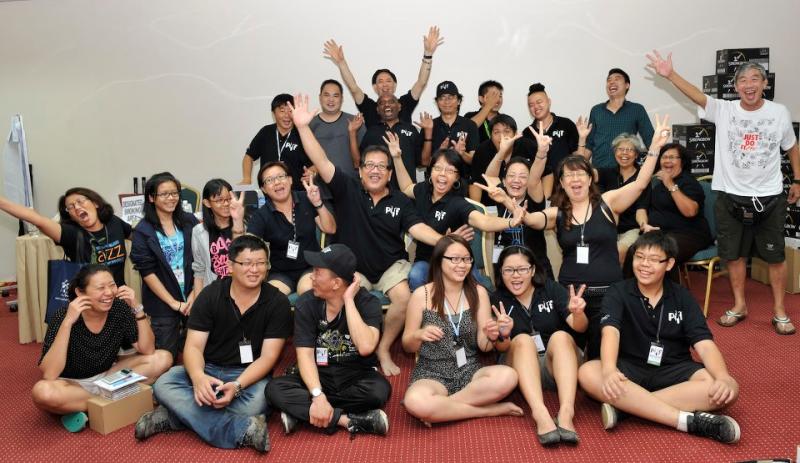
Strangely perhaps, Augustin feels that the PIJF is better known internationally than locally: "Locally it's like "Oh, it's just the PIJF. It's jazz, it's boring"—that kind of stuff," Augustin laughs, "but we're more respected abroad." In the beginning, Augustin had to court the local media, sending out press releases to every outlet imaginable in the hope that somebody would give the oxygen of exposure to the PIJF. As the festival has grown so has its reputation: "For several years we've had newspapers, webzines, magazines and ex-pat magazines writing to us and asking for information about the festival. We have gained significant media exposure," says Augustin.
The New Straits Times has been a consistent source of local support and now the PIJF has muscled its way into airline magazines too. For PIJF 2013 journalists are coming from a range of foreign countries and for the very first time the Lonely Planet is sending someone to cover Penang's very own jazz festival.
The local and even international media might be making a fuss over the 10th anniversary milestone but Augustin doesn't feel any extra pressure or weight of expectation. In his habitual cool, cheery manner he's just getting on with the job in hand: "I don't feel any pressure, actually. The beauty about getting to number 10 is that you can do what you like because It's your festival and you're running it," he says laughing." I don't think there are extra expectations or pressure this year. Just to put it on and make it happen is already a bloody achievement," he laughs.
The PIJF's growing international reputation is also due to the word of mouth recommendations of people who come from Australia, the UK, Thailand, Singapore, Indonesia, Hong Kong and South Korea, making the festival the centerpiece of a Malaysian holiday.
It's also in large part due to the hundreds of foreign musicians who have played the PIJF and who then spread the word: "The bands all play their best regardless of the size of the crowd because they never know who's watching them," says Augustin. "It's like the case of PELbO, they came on did a great set that blew the people away and John Cumming was there and he immediately took them to play the London Jazz Festival."
In a review of PELbO's performance at the 2011 London Jazz Festival , JazzTimes' Sam Spokony described the Norwegian trio as "nothing short of brilliant" and added: "John Cumming has helped one of Europe's great new collaborative talents get one step closer to breaking out." True enough, but Augustin and Choo Yeun of the PIJF probably deserve some of the credit for the chain of events.

Bands are coming to the PIJF from every corner of the world, but it seems that the opportunities for Malaysian bands to play abroad are much more restricted: "For that to happen bands need government support," Augustin says. "The South Korean government is doing a very good job of that. This year we have two Korean bands and somebody is giving a talk. They're also setting up an exhibition. The Korean Arts Management Service group (KAMS) is pushing it.
"It's interesting that they are supporting their musicians to come to Penang because I think they see PIJF as a stepping stone," Augustin ventures. "They're interested to know who are the journalists coming here and they want to meet up with them. It's a door to connections with Europe and elsewhere. Malaysia is starting to do that. If a band gets invited to play somewhere there is a support grant available that you can apply for. This year we took Liyana Fizi to the Jarasum International Jazz Festival."
Photo exhibitions have been a consistent feature of the PIJF, which has attracted two of the world's finest jazz photographers in William Ellis and Ziga Koritnik. Augustin has been inundated with suggestions to gather the best of the PIJF photos to create a 10th anniversary photographic book of the festival. Now is not the right time, however, for one very obvious reason. "It's only nine years," Augustin laughs. Hopefully if we get to the 11th year we have the intention of putting together a book and maybe a CD or even a DVD. Of course there are copyright issues but it's a plan. Or perhaps we could make a documentary," Augustin adds, "called how to survive for ten years with no money."
In actual fact, Augustin is in the process of putting together a book on the history of popular music in Penang with PIJF stalwart James Lockhead: "We've been commissioned to do a book and we're supposed to start now," laughs Augustin. It's going to be a coffee table book and maybe with a CD. Popular music in the 1940s and 1950s was actually jazz—big band dance stuff and swing and bossa nova. Penang was also very well known for its Hawaiian music.
"We've heard recordings that nobody's ever heard, like pianist Jimmy Boyle. This guy was amazing. There's a recording of him playing in 1953. He's like a Malaysian Ahmad Jamal. This guy was way ahead of anybody in Asia," Augustin says. The book, based on a photographic exhibition created by the PIJF will cover the pre-WWII years when there was a vibrant music scene in Penang, largely, Augustin acknowledges, because of external influences.
"In the 1920s and 1930s we were under British rule," Augustin explains. "They commissioned 64 Filipino musicians to come to Malaysia to be part of the Municipal bands in Singapore, Kuala Lumpur and Penang. The Philippines were renowned as good musicians. When the conflict was finished the British said they could stay in Malaya if they wanted. More than 90% of them chose to stay in Malaya and they integrated into the clubs and shows and they would set up bands. The British also brought in musicians from India and Pakistan after the war for the Municipal bands."
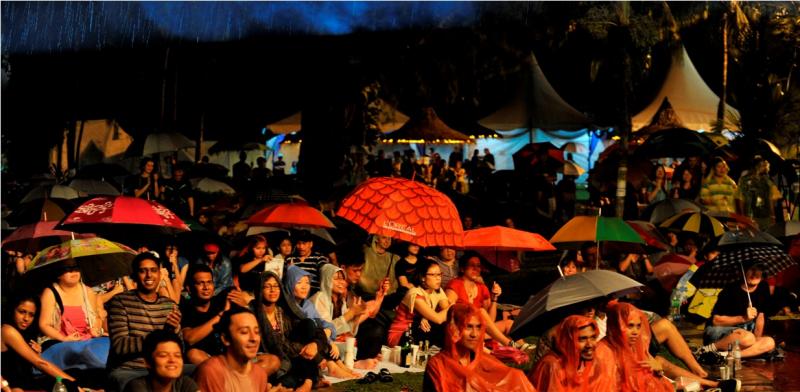
Agustin and Lockhead's research into the factors that influenced the development of music in Penang has thrown up a lot of interesting material. Those who can't wait for the coffee table book can get a preview of its central themes during this year's Island Forum when Lockhead, jazzahead!'s Peter Shultze and Ben Mandolsen appear on the panel discussion entitled "Popular Music Heritage Preservation."
The PIJF is dedicated to highlighting and preserving Malaysian jazz history, just as it to promoting the up and coming generation of musicians. Augustin, himself a noted bassist in popular Malaysian bands in the 1970s and 1980s understands that the music of today is founded on the music of the past. In the same way, the resilience and growth of the PIJF is the fruit of all the efforts of the past. Within a decade the PIJF has established itself as one of the very best jazz festivals anywhere in Asia.
It's no easy task to choose highlights of the first nine editions of PIJF: "For me, what's most memorable are not so much the performances themselves but more managing to put them on and seeing the reaction from the audience," says Augustin. "There are many standout memories: the Bob Aves Jazz Group featuring Grace Nono—that was a sort of world premier for his music, a fusion of Filipino traditional kulintang music and contemporary jazz where he played the Philippine octavina guitar."
Augustin also recalls the breathtaking performance of Brazilian guitarists Paulo Bellinati & Christina Azuma: "During their set the lights went off but they kept playing, which was great. The audience thought that it was part of the show." Of the Malaysian musicians Augustin recalls the opening show of PIJF 2009 by The Island Palm Beach Boys: "We wanted so much to show what Penang was all about in the 1940s & 1950s and I was really glad that the guys decided to do it."
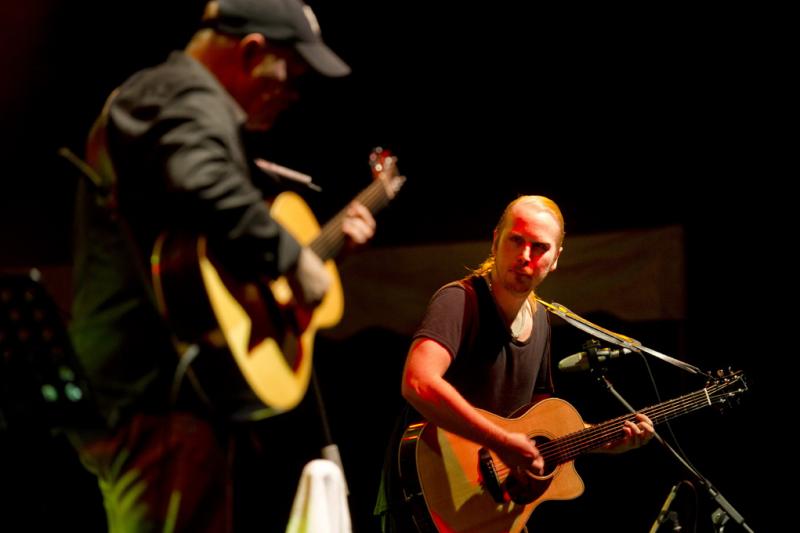
The late Paul Ponnudorai's incredible solo guitar performance at PIJF 2011 will long be remembered by all who saw it: "Paul told me later, after listening to the recording of his performance, that it was one of his best performances ever," says Augustin. The performance of Ulf Wakenius and Eric Wakenius was another high point for Augustin: "They were making their first ever stage appearance as a father and son duo."
One of the most logistically challenging performances over the years was that by the Penang Philharmonic Orchestra in 2010: "Granted they didn't play much jazz," laughs Augustin, "but it was fun getting them on stage." Augustin's roll of honor includes German a cappella group STIX—set to sing with Bobby McFerrin in 2014—Taiwanese group Sizhukong, PELBo and guitarists Tommy Emmanuel and Martin Taylor. He also takes great pleasure in having introduced Norwegian and Eastern European acts to Asia, but it's the less famous local names that have given him the greatest satisfaction: "It thrills us to watch some of the Fringe acts working their way up to the main stage like Elvira last year and Bihzhu this year."
Though the PIJF has come a very long way in the last decade it's still, however, a work in progress, seeking innovation and improvement all the time. Ask Augustin anytime how the PIJF is going and he replies: "Getting there man, getting there."
Photo Credits
Page 3 top: William Ellis
Page 8: Ziga Koritnik
All other photos courtesy of PIJF/Capricorn Connection
< Previous
Now
Next >
Memories in Motian
Comments
Tags
paul augustin
Interview
Ian Patterson
Malaysia
Kuala Lumpur
Miles Davis
Herbie Hancock
McCoy Tyner
Junji Delfino
Youn Sun Nah
Steve Hackett
Janek Gwizdala
Jo Jo Mayer
In the Country
jeremy monteiro
Organamix
Francesca Han
Sizhukong
Boi Akih
Jazz Kamikaze
Dainius Pulauskas
Keith Jarrett
wynton marsalis
William Ellis
Ahmad Jamal
Ulf Wakenius
Bobby McFerrin
Tommy Emmanuel
Martin Taylor
For the Love of Jazz
 All About Jazz has been a pillar of jazz since 1995, championing it as an art form and, more importantly, supporting the musicians who create it. Our enduring commitment has made "AAJ" one of the most culturally important websites of its kind, read by hundreds of thousands of fans, musicians and industry figures every month.
All About Jazz has been a pillar of jazz since 1995, championing it as an art form and, more importantly, supporting the musicians who create it. Our enduring commitment has made "AAJ" one of the most culturally important websites of its kind, read by hundreds of thousands of fans, musicians and industry figures every month.




















